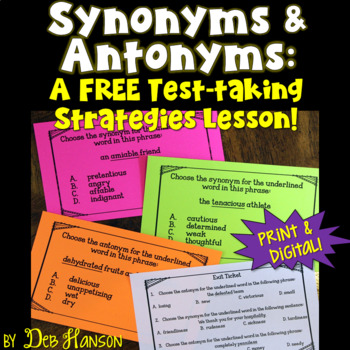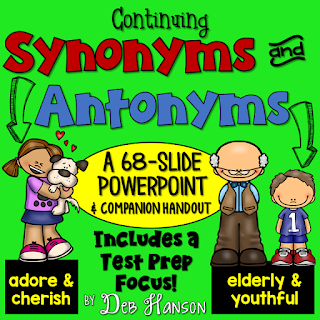Hello! It's Deb Hanson from Crafting Connections today! Today I'm going to share three helpful test-taking strategy that you can teach your students for when they encounter synonym and/or antonym questions on standardized tests!
What is your reaction when you see an ELA test question like this?
As an ELL specialist who worked with 3rd-5th grade ELLs for more than ten years, I can tell you that viewing such a question causes me to break out in a sweat! While my ELLs know the difference between a synonym and antonym, they so often don't get to prove their knowledge because of the advanced vocabulary words, like tenacious, present in multiple-choice questions.
After encountering several standardized test questions like this one, I began to teach my ELLs a few test-taking strategies in hopes that I would be giving them the tools that would allow them to be as successful as possible. In my opinion, these strategies are beneficial for all students, not just ELLs.
Synonym/Antonym Test-Taking Strategy #1
 |
| Clip art by Educlips and Hot Dawg Illustrations. Background by RebeccaB Designs. This slide was taken from my Advanced Synonym and Antonym PowerPoint. |
Synonym/Antonym Test-Taking Strategy #2
- I'm looking for an ANTONYM this time, so I have to change my thinking a bit.
- I remember learning that the Greek root hydra- means water.
- The de- in front of hydra- is a prefix. In words like defrost and detangle, the prefix de- means to remove.
- Using what I know about roots, I can determine that dehydrated refers to removing water from something. If you remove water from fruits and vegetables, they would be quite dry.
- However, I cannot choose answer C because I'm looking for the ANTONYM... not the synonym! If dehydrated means dry, then the ANTONYM would most likely be C (wet).
Synonym/Antonym Test-Taking Strategy #3
Some of the key points I would make in my think-aloud include:
- I'm looking for a SYNONYM this time.
- I don't know what amiable means, but since it's being used to describe the word friend, I am going to assume that it's a positive character trait. Therefore, I'm going to eliminate B (angry).
- When I look at A, I realize that I don't know what the word means, but I get the feeling that pretentious has a negative connotation- like someone is trying to pretend to be better than someone else, or someone who is hiding their true behavior or feelings. I'm going to eliminate A (pretentious).
- I don't know the meaning of affable or indignant, so now I'm just going to have to take a guess... but at least I eliminated two options before guessing! (At this point, I would switch to teacher-mode, and ask if any students know which option is correct.)
To conclude this lesson, I would distribute this exit slip, and have my students answer these three multiple-choice questions independently, using the strategies we just discussed.
If you would like to use the multiple-choice cards and the exit ticket with your own students, click HERE to download them for FREE!
These strategies are also introduced in my Continuing Synonyms and Antonyms PowerPoint, and more practice opportunities are provided in my Synonyms and Antonyms Task Cards. Click on either of the images to take a closer look at these resources, which are available for purchase in my TpT store.
If you have other test-taking strategies you teach your students, please leave a comment. I'd love to hear about them! Thanks for stopping by today!











